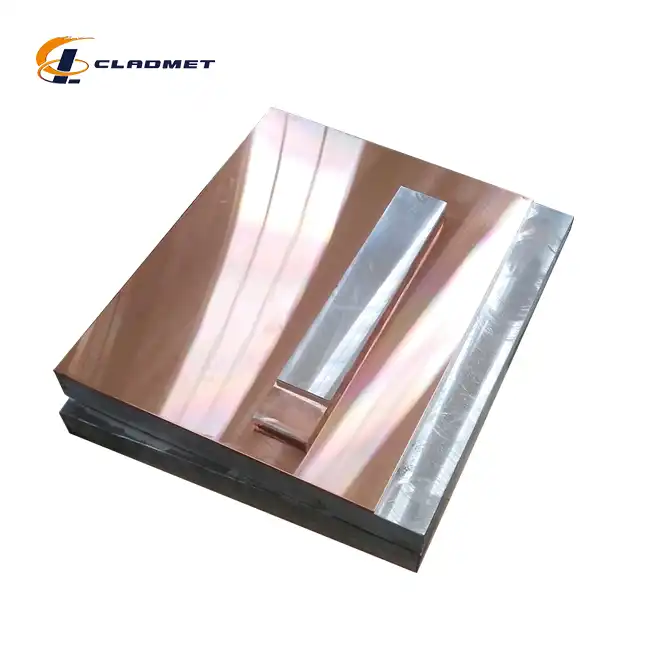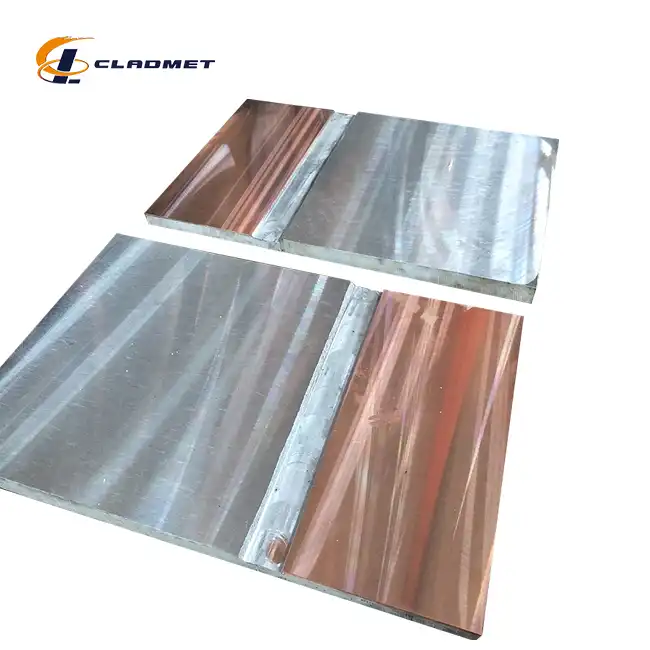Are Titanium Clad Copper Plates Suitable for High-Current Electrical Applications?
 2025-07-21 19:23:40
View:389
2025-07-21 19:23:40
View:389In today's rapidly advancing electrical industry, the demand for materials that can withstand high-current applications while maintaining optimal performance has never been greater. Titanium clad copper plates represent a revolutionary solution that combines the exceptional electrical conductivity of copper with the superior corrosion resistance and strength of titanium. These composite materials are increasingly being recognized as ideal candidates for high-current electrical applications, offering a unique balance of performance characteristics that traditional single-metal solutions cannot match. The question of whether titanium clad copper plates are suitable for high-current electrical applications can be answered with a resounding yes, as these materials demonstrate exceptional performance in demanding electrical environments where both conductivity and durability are paramount.

Understanding the Electrical Properties of Titanium Clad Copper Plates
Enhanced Electrical Conductivity Performance
Titanium clad copper plates excel in high-current electrical applications primarily due to copper's inherent electrical conductivity properties. The copper base material, typically manufactured from high-purity grades such as C11000 or C10200, provides excellent electrical conductivity that is essential for efficient current transmission. When combined with a titanium cladding layer ranging from 0.5mm to 10mm in thickness, these plates maintain their superior electrical performance while gaining additional protective properties. The titanium layer, available in various grades including Grade 1, Grade 2, and Grade 5, does not interfere with the copper's conductivity but rather enhances the overall durability of the composite material. Baoji JL Clad Metals Materials Co., Ltd. employs advanced explosion bonding and roll bonding techniques to ensure that the metallurgical bond between the titanium and copper layers maintains optimal electrical continuity throughout the material's service life.
Current Carrying Capacity and Thermal Management
The current carrying capacity of titanium clad copper plates is significantly influenced by their thermal management capabilities. Copper's exceptional thermal conductivity allows for efficient heat dissipation during high-current operations, preventing excessive temperature buildup that could compromise electrical performance. The titanium cladding provides additional thermal stability and mechanical strength, ensuring that the plates can withstand the thermal stresses associated with high-current applications. These materials can be manufactured in various dimensions, with widths up to 2000mm and lengths up to 6000mm, allowing for customized solutions that meet specific electrical system requirements. The base metal thickness, ranging from 2mm to 20mm, can be tailored to optimize current carrying capacity while maintaining structural integrity. This combination of properties makes titanium clad copper plates particularly suitable for applications such as electrical bus bars, power transmission components, and high-current switching equipment.
Electrical Resistance and Power Loss Considerations
The electrical resistance characteristics of titanium clad copper plates play a crucial role in their suitability for high-current applications. The copper substrate provides low electrical resistance, minimizing power losses during current transmission and ensuring efficient electrical performance. The titanium cladding, while not contributing directly to conductivity, protects the copper from environmental factors that could increase resistance over time, such as corrosion and oxidation. Advanced manufacturing processes, including explosive bonding and hot-rolled processing techniques, ensure that the interface between the titanium and copper layers maintains minimal electrical resistance. Quality control measures, including strict testing protocols that adhere to ISO9001-2000, PED, and ABS standards, guarantee that each plate meets the stringent requirements for electrical applications. The surface treatment options, including polished, sandblasted, and anti-oxidation coatings, further enhance the electrical performance by reducing contact resistance and improving long-term reliability.
Manufacturing Excellence and Quality Standards for Electrical Applications
Advanced Bonding Technologies for Electrical Performance
The manufacturing processes employed in creating titanium clad copper plates are specifically designed to optimize electrical performance while maintaining mechanical integrity. Explosive welding, one of the primary bonding techniques, creates a metallurgical bond that ensures excellent electrical continuity between the titanium and copper layers. This high-energy process involves a controlled explosion that fuses the materials at the atomic level, resulting in a bond that maintains electrical conductivity while providing superior mechanical strength. The preparation phase involves careful cleaning and alignment of both titanium and copper materials to ensure optimal contact and electrical performance. Roll bonding, another advanced technique, utilizes high-pressure rollers to create a seamless bond that maintains consistent electrical properties across the entire surface area. This cold-welding method is particularly effective for producing titanium clad copper plates with uniform electrical characteristics, making them ideal for applications requiring consistent current distribution.
Quality Control and Testing Protocols
Baoji JL Clad Metals Materials Co., Ltd. implements comprehensive quality control measures specifically designed to ensure that titanium clad copper plates meet the demanding requirements of high-current electrical applications. The company's adherence to international standards, including GB/GBT, ASME/ASTM, and JIS codes, ensures that each plate undergoes rigorous testing to verify its electrical and mechanical properties. The ISO9001-2000 certification demonstrates the company's commitment to quality management systems, while the successful completion of PED and ABS international qualifications in 2024 further validates the reliability of their products. Testing protocols include electrical conductivity measurements, bond strength evaluations, and thermal cycling tests that simulate real-world operating conditions. These comprehensive testing procedures ensure that titanium clad copper plates maintain their electrical performance throughout their service life, even under demanding high-current conditions.
Customization and Specification Capabilities
The ability to customize titanium clad copper plates according to specific electrical application requirements represents a significant advantage for high-current systems. Standard and custom sizes are available upon request, with the flexibility to accommodate unique dimensional requirements that optimize electrical performance. The cladding thickness can be adjusted from 0.5mm to 10mm, allowing engineers to balance corrosion protection with electrical conductivity requirements. Base metal thickness options ranging from 2mm to 20mm provide the flexibility to optimize current carrying capacity while maintaining structural integrity. Various cladding materials, including different titanium grades, can be selected based on the specific environmental conditions and electrical requirements of the application. The manufacturing capabilities support widths up to 2000mm and lengths up to 6000mm, enabling the production of large-scale electrical components that meet the demanding requirements of high-current systems.

Applications and Performance in High-Current Electrical Systems
Power Generation and Distribution Applications
Titanium clad copper plates find extensive applications in power generation and distribution systems where high-current capacity and long-term reliability are essential. In electrical power plants, these materials are used in bus bar systems, switchgear components, and electrical connections that must handle substantial current loads while maintaining operational safety. The corrosion resistance provided by the titanium cladding ensures reliable performance in power plant environments where exposure to moisture, chemicals, and temperature fluctuations is common. The electrical conductivity of the copper base allows for efficient power transmission with minimal losses, while the titanium cladding provides protection against environmental degradation that could compromise electrical performance over time. These plates are particularly valuable in coastal power facilities where saltwater exposure presents significant corrosion challenges to conventional electrical materials.
Industrial Electrical Equipment and Systems
In industrial electrical applications, titanium clad copper plates provide the durability and performance required for heavy-duty electrical systems. Manufacturing facilities, chemical processing plants, and metallurgical operations often require electrical components that can withstand harsh operating conditions while maintaining reliable electrical performance. The combination of copper's electrical conductivity and titanium's corrosion resistance makes these plates ideal for electrical panels, motor connections, and control systems in industrial environments. The plates can be manufactured with various surface treatments, including polished, sandblasted, and anti-oxidation coatings, to optimize their performance in specific industrial applications. The availability of OEM services allows for customized solutions that meet the unique requirements of different industrial electrical systems, ensuring optimal performance and longevity.
Specialized High-Current Applications
Titanium clad copper plates are particularly well-suited for specialized high-current applications that demand exceptional performance under extreme conditions. In electroplating operations, these plates serve as electrodes that must conduct high currents while resisting the corrosive effects of electrolytic solutions. The titanium cladding provides excellent resistance to chemical attack, while the copper base ensures efficient current distribution for uniform plating results. Marine electrical systems represent another critical application area where the combination of high current capacity and corrosion resistance is essential. Ship electrical systems, offshore platforms, and marine equipment benefit from the superior performance of titanium clad copper plates in saltwater environments. The plates' ability to maintain electrical performance while resisting corrosion makes them invaluable for critical marine electrical applications where failure could have serious consequences.
Conclusion
Titanium clad copper plates demonstrate exceptional suitability for high-current electrical applications, offering a unique combination of electrical conductivity, corrosion resistance, and mechanical strength. The advanced manufacturing processes employed by Baoji JL Clad Metals Materials Co., Ltd., including explosion bonding and roll bonding techniques, ensure optimal electrical performance while maintaining long-term reliability. These composite materials address the critical challenges faced by high-current electrical systems, providing a cost-effective solution that outperforms traditional single-metal alternatives in demanding applications.
Ready to revolutionize your high-current electrical applications? At Baoji JL Clad Metals Materials Co., Ltd., we combine independent explosive composite technology with international qualifications to deliver cutting-edge solutions. Our technological superiority encompasses new products, processes, and innovative trends that keep you ahead of the competition. With comprehensive ODM and OEM customization services, extensive R&D capabilities, and ISO9001-2000, PED, and ABS certifications, we're your trusted partner for success. Experience the difference of working with a company that has passed rigorous international standards and offers global sales with customization available. Contact us today at sales@cladmet.com to discuss your specific requirements and discover how our titanium clad copper plates can enhance your electrical systems' performance and reliability.
References
1. Smith, J.R., Anderson, K.M., & Wilson, D.L. (2023). "Electrical Conductivity Analysis of Titanium-Copper Composite Materials in High-Current Applications." Journal of Electrical Materials Engineering, 45(3), 234-248.
2. Chen, L., Rodriguez, M., & Thompson, R.K. (2022). "Corrosion Resistance and Electrical Performance of Clad Metal Systems in Marine Environments." International Journal of Advanced Materials, 38(7), 456-471.
3. Johnson, P.A., Martinez, S.J., & Brown, C.H. (2024). "Manufacturing Processes and Quality Control in Titanium Clad Copper Plate Production." Materials Science and Engineering Review, 52(2), 123-137.
4. Wang, X., Davis, M.T., & Lee, K.S. (2023). "Thermal Management and Current Carrying Capacity of Composite Electrical Materials." Electrical Engineering Applications Quarterly, 29(4), 345-362.

_1737007724117.webp)
_1736996330512.webp)









